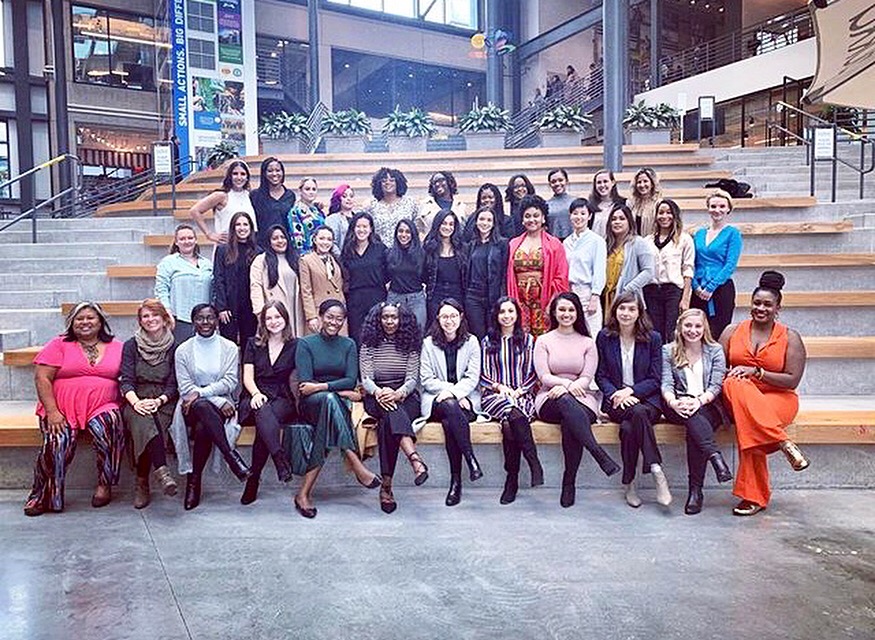I want to tell you a little story about my friend Erika.
A few weeks ago I arrived back in Italy from a stint in New York City. At the airport, I passed through immigration without a care in the world (a privilege I am constantly aware of), picked up my bags, took the bus back to Torino and was met by my boyfriend for the walk back home. I had just finished an intensive professional development workshop given by Vital Voices Global Partnership, in collaboration with TRESemme, after becoming one of 29 women chosen as fellows for their 2019 Leadership Incubator.
Founded in the early nineties by First Lady of the United States, Senator, and Secretary of State, Hilary Clinton, and Secretary of State Madeline Albright, Vital Voices has continued the mission that when you invest in women, you improve the world. Throughout the workshop, we discussed the importance of speaking up, and not just as women, but also as members of the global community.
A couple of hours later, a lovely home-cooked meal and some much-needed cuddling with my love, it was Thursday morning and my phone was buzzing with a text from my colleague and friend, Erika Baewert.
She was verbally attacked and threatened on the bus just minutes earlier by an elderly man, for defending a young migrant mother.
The reality of our work in Italy smacked me in the face and woke me up from my New York City fairytale. The high of spending the last few days swaddled in positive energy was eviscerated as I read over Erika’s messages with a lump in my throat, and a heaviness that reminded me that there was still much work to be done. Later that evening, I met Erika to discuss the events of the day and come up with some solutions that could help us both, not just as women working in this field, but as advocates for empathy.
She recounted her story to me, breathing deeply at the end of every sentence.

She was on her way to classes at the University of Torino when the bus driver began to make loud comments towards the young mother sitting behind him — berating the woman for not being a good “mom” and talking on the phone while her child was crying. When Erika intervened, she was not only verbally attacked by the bus driver, but also by an elderly gentleman who felt it necessary to approach Erika, accuse her of being a drug addict and tell her to go ahead and convert to Islam.
He then, without provocation, moved closer towards her with his fist, threatening to beat her for telling him that what he and the bus driver were doing to the young mother was wrong. Erika and the young mother were significantly distraught.
When she retold this to me, she added, “I was shaking. But not only because I was scared that he was threatening to assault me, but because I was so damn angry at him for his actions, for his assumptions. I was mad as hell!” Her anger, I understood all too well.
I had experienced my fair share of verbal and physical assault in Italy; in fact, figuring out how not to have a random guy start yelling and pushing you was, and still is, my daily morning routine before I leave the house. Women of color in Italy are almost always verbally threatened and in the worst cases, physically harmed.
I felt for Erika. She was not only the woman I chose to assist me in the vision of my work in Italy, but she had become my close friend and my partner in the fight for human rights.
As we sat together and allowed the bartender to pour our second round of wine, I thought about what Erika and I could take away from this awful situation and bring towards our work together.

Here is what we understood: using your voice will always be a vital step towards change.
Standing up for what is right, and in a lot of cases, intervening when a wrong has occurred, are no longer options — they are necessary. I’m not saying folks should go out and put themselves in harm’s way, what I am saying is that we are all given chances to change the narrative, and we need to be ready to take them.
What Erika did was to use her voice to correct a situation that left a young migrant mother feeling helpless and alone. By speaking up, she challenged the status quo and the perception that migrants and refugees (well, let’s be honest: WOMEN) are supposed to sit quietly and allow men with rotten agendas act disrespectfully and without consequence. In Erika’s view, the time was officially up.
Later that evening, my boyfriend and I talked about what it meant to overcome adversity and to continue fighting for what’s right. The truth is, we live in a complicated Italian society and what is right and what is wrong is revised daily. What we have come to conclude is that through adversity comes wisdom, and when you are wise, you make better decisions.

During my fellowship induction in New York, one of the challenges that was put forth to my cohort and me was to think deeply about our core values. Led by one of our mentors, Cici Battle, we were asked to identify three values that would influence our leadership style. I chose love, empathy and awareness.
In all that I do, I hope to lead with love, be empathetic towards the people around me, and most of all, I hope to have the courage to be self-aware.
We live in a connected world, and the actions of someone else, whether good or bad, do affect us. Erika knew this. She led with love, she empathized, and she remained self-aware — using her voice was the ultimate outcome.











